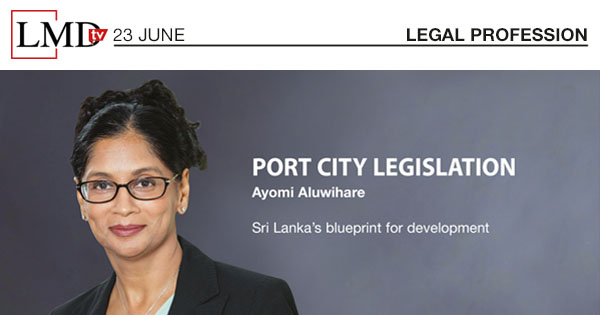LMD TV
“The Board of Investment (BOI) legal framework and the Strategic Development Projects Act legal framework set up free trade zones, and a concession and exemption regime for investment,” said Ayomi Aluwihare – Precedent Partner of F. J. & G. de Saram – in regard to the Port City (Colombo International Financial City a.k.a. CIFC).
 She continued: “The Colombo Port City Act sought to set up a special economic zone. Special finance zones are not new; we have similar zones in Asia, the Middle East and the North African region.” The law specifically provides that the investment is to be raised from international sources, in an attempt to develop cross-border financial services.
She continued: “The Colombo Port City Act sought to set up a special economic zone. Special finance zones are not new; we have similar zones in Asia, the Middle East and the North African region.” The law specifically provides that the investment is to be raised from international sources, in an attempt to develop cross-border financial services.
“The special economic zone is primarily to facilitate the diversification of foreign financial services,” Aluwihare noted. The Port City Act creates space for services such as shipping logistics, banking and financial services, and corporate headquarter services that would set up their bases in Sri Lanka.
This raises an important question as to who can invest in the Port City. Aluwihare explained that “it will be foreign investors mainly but local investors will be able to lease their land.”
Furthermore, she informed that local investors together with foreign investors – or a consortium of foreign investors – may seek approval from the commission to operate within the Port City once the land is leased. According to her, telecommunications, utility services and other infrastructure requirements of the Port City will give rise to local investment opportunities.
“Port City Colombo will continue to be governed by the laws of Sri Lanka,” she continued, adding that “this is an endeavour to attract foreign investment; therefore, the commission is able to grant certain exceptions from the application of certain provisions of laws that are listed, and to offer incentives.”
Furthermore, she stated: “Not every business engaged in the Port City will be entitled to exemptions or incentives,” adding that businesses need to be identified to have strategic importance to the national economy to qualify for exemptions.
Aluwihare elaborated on the Supreme Court’s judgement on the constitutionality of the Port City Bill. “The Supreme Court’s decision dealt with three aspects,” she asserted. “The area of authority of Port City Colombo is a part of the territory of Sri Lanka; and the parliament has the legislative authority to pass laws in relation to the Port City – i.e. the Port City Act,” she said.
In addition to this, she remarked: “In the Port City Bill, certain provisions held that were inconsistent with the constitution were suggested to be changed. Those changes are now reflected in what is the Port City Act.”
Moreover, Aluwihare shared her views on factors that contribute to investor trust and confidence in Sri Lanka. “Investor perceptions of the whole country matter for the success of Port City,” she remarked.
To this end, she believes that “good governance; independent and impartial regulation; clarity and certainty in policy and implementation of policies; and the ability of the skilled workforce to adapt and compete with foreign workers who may be recruited to the Port City is necessary.”
Touching on how the legal profession has evolved over the past year or so, Aluwihare stated that technology has been a major cause for the transition. “The Ministry of Justice is in the process of digitalising the litigation processes in courts,” she noted, emphasising that virtual proceedings have been a game changer for witnesses who are overseas during hearings.
Concluding the interview with her thoughts on digital laws in Sri Lanka, Aluwihare declared: “Electronic Transactions Act is an important law.” Besides this, she stated: “The Computer Crime Act, Payment and Settlement Systems Act along with data protection laws and cybersecurity laws are necessary to strengthen the legal framework for a Digital Sri Lanka.”



